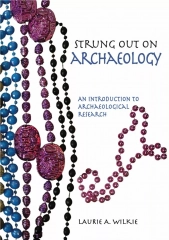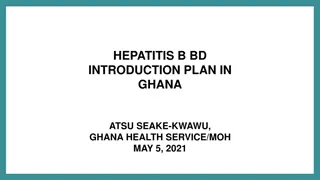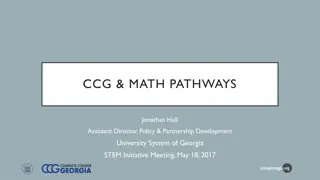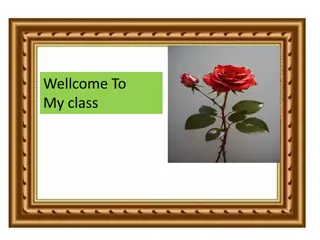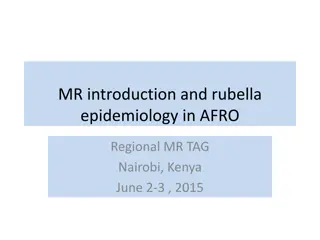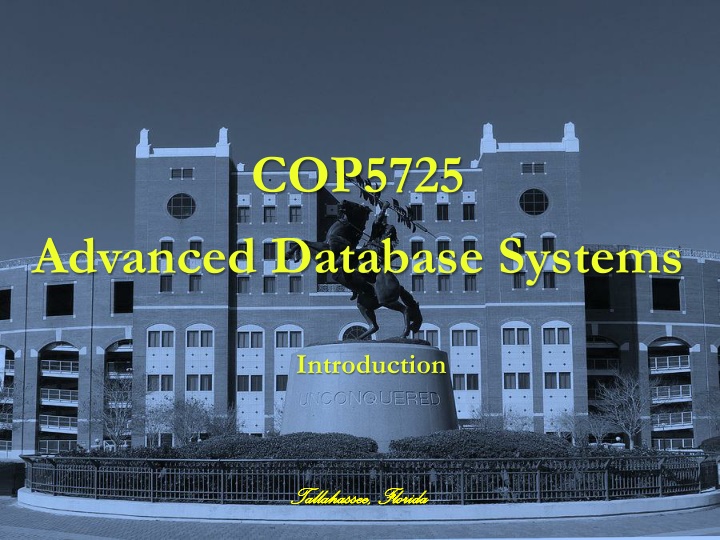
Advanced Database Systems Course Overview at FSU
Explore the COP5725 Advanced Database Systems course at Florida State University (FSU) in Tallahassee. Delve into relational database internals, query processing, data mining, and more. Gain insights into the syllabus, textbooks, prerequisites, and course components. Enhance your understanding of advanced database topics and technologies.
Download Presentation

Please find below an Image/Link to download the presentation.
The content on the website is provided AS IS for your information and personal use only. It may not be sold, licensed, or shared on other websites without obtaining consent from the author. If you encounter any issues during the download, it is possible that the publisher has removed the file from their server.
You are allowed to download the files provided on this website for personal or commercial use, subject to the condition that they are used lawfully. All files are the property of their respective owners.
The content on the website is provided AS IS for your information and personal use only. It may not be sold, licensed, or shared on other websites without obtaining consent from the author.
E N D
Presentation Transcript
COP5725 Advanced Database Systems Introduction Tallahassee, Florida Tallahassee, Florida
Welcome to COP5725! COP5725: Advanced Database Systems Course website: syllabus, schedule, project info, resources http://www.cs.fsu.edu/~zhao/cop5725/main.html Canvas: announcements, grades, files Time: 9:45am 11am Tuesdays and Thursdays Venue: HWC 2401 Please go over the course syllabus carefully before taking the class! FSU first-day attendance policy 1
Welcome to COP5725! Instructor Prof. Peixiang Zhao http://www.cs.fsu.edu/~zhao Office hours: Tuesday/Thursday right after class Office: LOV 361 Research interest: Database, data mining, data-intensive computation and analytics TA TBA You! Master or Ph.D.? CS or other majors? Graduating? Am I qualified for this class? What are my expectations? 2
The Goal of COP5725 1. Reflection of the foundation: Climb up to the shoulders the foundational (relational) database models, representations, systems, and techniques, by way of reading and lectures 2. Projection on the outlook: And look out from here! Be inspired what s the next advanced database systems? by way of reading, summarizing, and presenting the classics and the state of the art (SOTA) by way of doing projects! We can do it! 3
The Contents of COP5725! Relational Database Internals Data storage and representation Indexing Query processing and execution Query optimization Advanced Database Topics Parallel/Distributed databases Data mining Data on the Web 4
Welcome to COP5725! Textbook Database Systems: The Complete Book 2nd edition Hector Garcia-Molina, Jeff Ullman and Jennifer Widom Recommended reading Database Management Systems 3rd edition, by Raghu Ramakrishnan and Johannes Gehrke Readings in Database Systems 5th edition, by Peter Bailis, Joseph Hellerstein and Michael Stonebraker The Web Prerequisites COP4530: Data Structures and Algorithms COP4710: Database Systems (You will be tested on this) Good programming skills (C++ or Java) 5
Welcome to COP5725! Components of the course 1. Two lectures every week 2. Three(Two) assignments (15%) 3. A series of (5 or 6?) papers to be read and summarized (15%) One- or two-page paper summary (Details later ) 4. Paper presentation (5%) Every group/student will present one paper related to her/his project in the class for 15(?) minutes (Details later ) 5. Semester-long project (Details later ) (30%) Implementation-flavor Research-flavor 6. Final exam (35%) 6
Paper Summaries Every paper will be assigned early in the course website, and can be downloaded within the campus network One to two pages summary includes What is the problem? Why is this problem important and worthy of a thorough study? Why is this problem difficult or not well solved? What are the innovative ideas and technical merits? Technical meat (Please elaborate on them) How to evaluate? Experimental findings (if any) Any drawbacks and potential improvement? Summarize based on your own understanding Verbatim copying from the papers or ChatGPT results in low scores 7
Paper Presentation Every group/student will have a chance to select one paper to present in the class The paper should be related to the project you are conducting The slides (pptx/pdf) should be sent to the instructor at least one day prior to the class you will be presenting The slides organization should be similar to the requirement of the paper summary 15(?) minutes presentation and Q&A Student will sign up for the presentation in the near future 8
Project Theme: choose either of the two 1. Implementation-flavor find interesting methods/algorithms in a data management paper in the designated conferences/journals on or after 2015, implement it, and perform experimental studies by a group of at most three students (?) 2. Research-flavor find an interesting, nontrivial data management problem, propose a novel and effective solution to it by a group of at most three students The project is partitioned into multiple milestones, each of which requires deliverables 9
How to Get the Most out of COP5725? Read and think before class read the textbooks for related concepts read the papers Use lectures as road map for studying Lecture notes won t cover all the material Use your peers in learning discuss in/out of classes to enhance understanding Explore interesting projects creatively learning by doing 10
COP5725 = How DB Knowledge is created + How to create more In terms of topics, COP5725 is NOT: about Linux + Apache + PHP + MySQL (LAMP) about designing DBs that are in BCNF or 3NF about SQL3 and stored procedures about Oracle tuning and implementation In terms of methodology, COP5725 is NOT by reading textbook and acing it by implementing a well-specified DB algorithm, e.g., B+tree 11
Any questions so far? COP5725-2023 Final Letter Grade (82 in total) 25 21 20 20 17 15 10 9 10 5 5 0 A A- B+ B B- F A A- B+ B B- F 12
Why Database Systems? --- Utility Ubiquitous and incredibly useful Book a hotel, a flight, an Uber car Like a post on Twitter (now X) or Facebook Find out where to eat from Yelp, TripAdvisor, or GrubHub Transfer money, or make a stock trade Find a movie to watch on Netflix Make a purchase on Amazon, or at local Walmart store Virtually every app is backed by such systems Backbone of modern science, where massive volumes of data are generated and a need to make sense of it Genomics, astronomy, meteorology, economy, social studies, 13
Why Database Systems? --- Centrality Data is at the center of modern society Huge promise, but many potential concerns Use and misuse Timely debates, and potential research frontiers, about the use of data, privacy, security, ethics, fairness, Data infrastructure (i.e., database systems) determines what s possible and what is feasible As data is central, the infrastructure to manage data is just as central 14
Why Database Systems? --- The Core of Computing Data growth will continue to outpace computation Key bottleneck in the future: data ingestion, processing, and understanding Systems for data at scale: the core of computing Techniques you learn in this class underlie many topics in computing Abstraction, representation & modeling, reuse, rapid access, declarativity, optimization, 15
Every Minute in Our World! https://www.domo.com/learn/infographic/data-never-sleeps-8 16
Why Database Systems? Opportunities in Research Jeffrey Ullman, 2020 Information Integration, Data Warehouses, Data Mining 17
Evolution of Data Management Jim Gray: Evolution of Data Management. IEEE Computer 29(10): 38-46 (1996) 18
Evolution of Data Management After computers were invented, data was far from automated flat file system a simple consecutive list of records that required search sequentially IBM IMS (1960s) Inverted hierarchical tree structure GE Network Model E. F. Codd: A relational Model of Data for Large Shared Data Banks (1970) Separating data from compute and from applications Framework for storing and retrieving data using simple tables Initial query language for relational DBs 19
Prehistory Thoughts: Emergence of the Notion of DBMS William C. McGee: Generalization: Key to Successful Electronic Data Processing. J. ACM 6(1): 1-23 (1959) When data processing was mostly ad-hoc programs --- Need generalization, e.g., sorting file maintenance data access modification and update report generation 20
How Did We Get Here? The dominating relational database system, which we take for granted now, was deemed impossible to implement and difficult to use in its early days But-- Quoting Jim Gray: These innovations give one of the best examples of research prototypes turning into products. The relational model, parallel database systems, active databases, and object-relational databases all came from the academic and industrial research labs. The development of database technology has been a textbook case of successful collaboration between academy and industry. -- Evolution of Data Management 21
The Grand Challenges of Data Management Relational DBMS was invented in early 70 s, and now 60+ billion mature industry What are we still working on? NoSQL, NewSQL, Data lakes, Temporal DB, Graph DB, Data streams, Blockchain DB, Vecter DB, http://www.youtube.com/watch?v=LrNlZ7-SMPk What is the ultimately advanced DB? Data of all sorts--- Prevalent on the Web! What have you been searching lately? New challenges naturally arise structured vs. unstructured data querying vs. analysis vs. searching Integration and interplay with AI and Deep Learning 22
Have fun! Tallahassee, Florida Tallahassee, Florida

